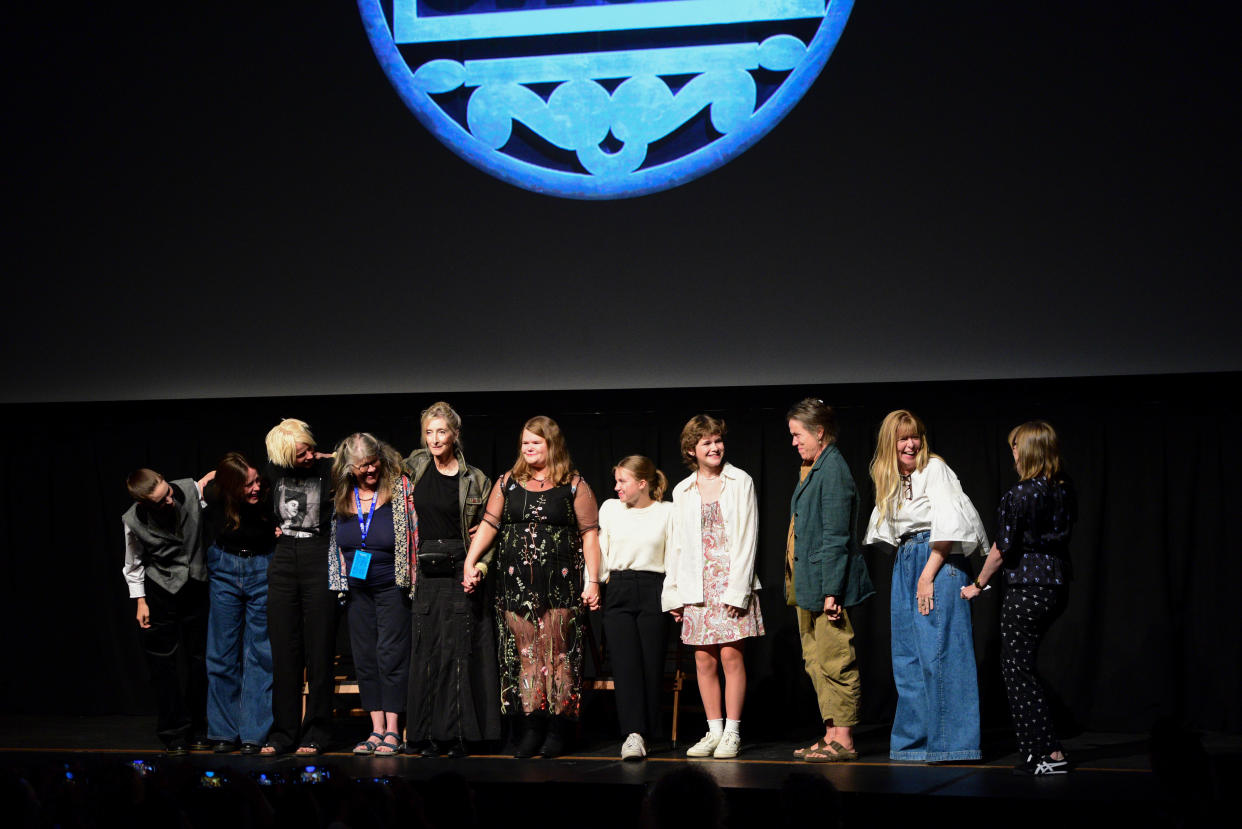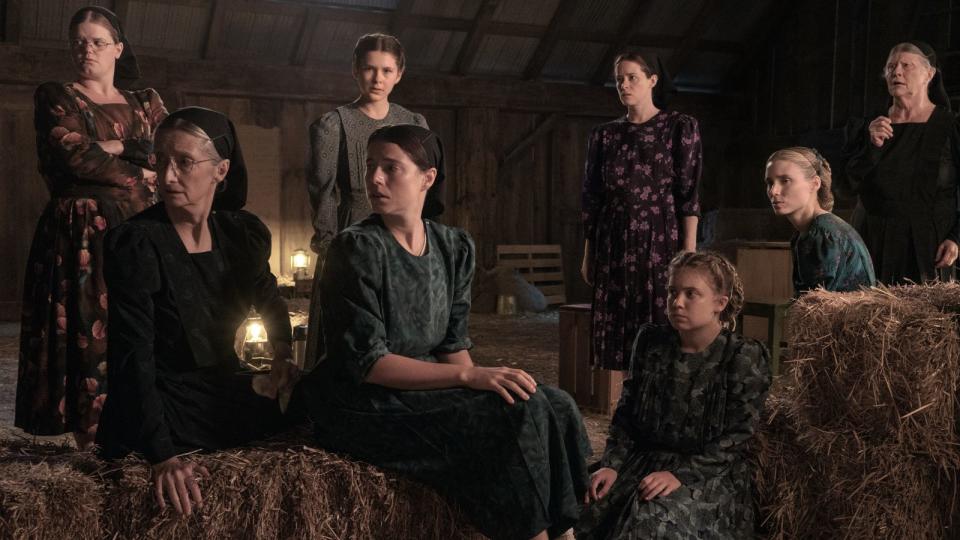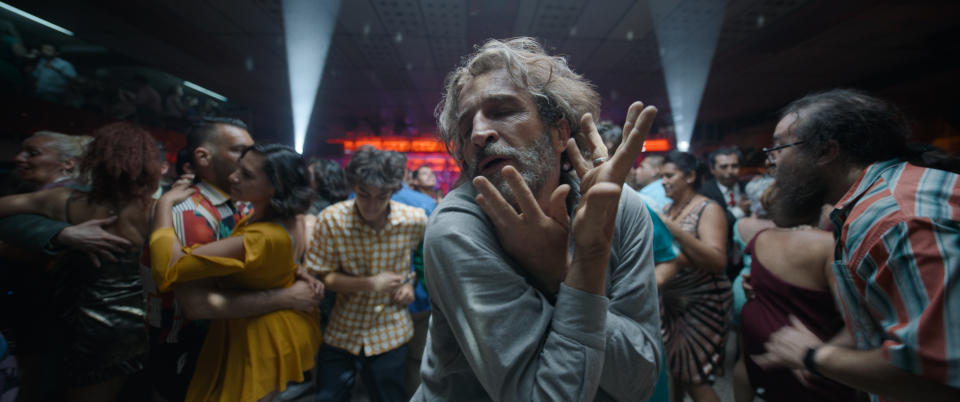‘Women Talking’ Enters Oscar Race with a Cast That Might Compete with Itself

- Oops!Something went wrong.Please try again later.
- Oops!Something went wrong.Please try again later.
- Oops!Something went wrong.Please try again later.
“Women Talking” premiered at the Telluride Film Festival on Friday immediately after a warm tribute to director Sarah Polley, and the response confirmed its Oscar bonafides. However, Polley’s riveting look at a group of Mennonite women who mobilize against the rapists in their community presents a challenge for distributor UA/MGM as its busy ensemble could end up competing with itself.
From the moment that nine actresses from “Women Talking” crowded the stage before the movie’s premiere, it was clear that the movie offered up a wide array of performances. Polley’s absorbing, stripped-down adaptation of Miriam Toews’ novel almost exclusively unfolds in the confines of a barn, where the women in question gather to discuss their options. Having discovered that men in their community have been drugging and raping them in their sleep, they’ve already managed to get a few of them arrested — while the rest of the men have left town to arrange for their compatriots’ release. That gives the victims a solid two days to discuss what to do next: Stay and fight? Live with it? Or get the hell out?
More from IndieWire
The premise is near-theatrical in nature, but riddled with an array of rich performances in closeups. As the pregnant Ona, Rooney Mara plays the most uncertain of the group, while trading knowing glances with Ben Whishaw’s sympathetic schoolteacher (the only onscreen male character of the movie). Claire Foy plays Ona’s feisty older sister who’s gunning for revenge, while Jessie Buckley seems hellbent on arguing with everyone in her orbit. This trio of performances stand out as the most prominent of the movie, but there are also compelling turns by Michelle McLeod, Judith Ivey, and Sheila McCarthy, not to mention a bit part for producer Frances McDormand as a dyspeptic older woman who wants no part of these proceedings.
Given that the movie often turns on various ways each member of the ensemble contributes to the central debate, it’s hard to discern a single lead performance in the movie. If UA/MGM submits its entire cast as supporting actresses (with the exception of Whishaw, of course), it’s quite possible that Whishaw, Foy, and Buckley could all get nominated and compete for the same prize. That strategy could echo the one taken by Open Road for “Spotlight” in 2016, when the entire cast was submitted in supporting categories (only Mark Ruffalo and Rachel McAdams made the cut).

ORION PICTURES RELEASING LLC. All Rights
However, a few scenes of “Women Talking” play up the dynamic between Mara and Whishaw enough to make the case that she could be considered as the movie’s lead. The actress has been nominated in both categories before (for Best Actress in “The Girl with the Dragon Tattoo” and Best Supporting Actress in “Carol”), but it’s not yet clear which of those categories would best suit her this year. Meanwhile, Whishaw’s sensitive performance is an obvious candidate for Best Supporting Actor, though the season could get awkward if he gains momentum in that category while the rest of the cast cancel each other out.
Regardless of how that acting field takes shape, Polley is a strong contender for Best Adapted Screenplay, as she’s managed to condense Toews’ book into an engrossing chamber drama that consolidates remarkable debates about patriarchal oppression and abuse into 104 minutes. Polley was nominated in that category for her tender debut “Away from Her” in 2006 and won further acclaim for her innovative autobiographical 2011 documentary “Stories We Tell,” but her more recent phase — she also has a new book of essays out about her career that deals with her traumatic experiences as a child actresses — positions her as an industry veteran that could help further elevate her appeal in the season ahead.
The movie’s inquisitive style and its suspenseful pace will help make the case as a Best Director candidate. In her tribute, Polley proved that she was adept at explaining her lifelong show business experience. “I remember Kathryn Bigelow saying to me when I made my first short film, ‘You have to be like a dog with a bone, and everyone’s going to try to take it away from you,’” Polley said. “That got echoed by every female filmmaker I worked with.”
Meanwhile, the movie has additional historic weight in the Best Picture category: With “Moonlight,” Plan B producer Dede Gardner became the first woman to win two Oscars for Best Picture; if “Women Talking” were to win, she’d be the first to have three. And her fellow producer McDormand would be only the second woman to win the Best Picture Oscar twice following her win for “Nomadland” in 2021.
These odds depend in part on how well the movie performs in other categories. Debates will swirl about the sepia-toned digital cinematography from Luc Montpellier, but the catchy, awe-inspiring score by Hildur Guðnadóttir (“Joker”) is a definite highlight. The Icelandic composer may also be competing with herself this season as she also wrote the score for Todd Fields’ “Tár,” whose lead actress Cate Blanchett is the recipient of another tribute at Telluride coming up this weekend.
“Women Talking” wasn’t the only contender to deal with insular religious communities and dark secrets on the first day of the festival. “The Wonder,” the Netflix-produced adaptation of Emma Donaghue’s book, features a winning Florence Pugh performance as a 19th century nurse assigned to observe a fasting girl in a religious community while trying to save her life. In the aftermath of her Best Supporting Actress nomination for “Little Women” in 2020, Pugh could be a dark horse for Best Actress, while the script — which director Sebastian Lelio wrote with Donaghue and Alice Birch — might give “Women Talking” some company in the Best Adapted Screenplay conversation.

© Limbo Films, S. De R.L. de C.
Netflix had a busy first day in Telluride as it arranged for vans to shuttle journalists from the evening premiere of “Women Talking” at the Palm Theater all the way to the Werner Herzog for “Bardo (Or False Chronicle of a Handful of Truths),” making its North American premiere two days after a divisive response in Venice. Telluride regular Alejandro G. Iñarritu (he brought “Birdman” here post-Venice in 2014) made the trans-Atlantic voyage the previous night and seemed eager to engage with a cozier atmosphere.
With its surrealist look at the plight of a Mexican documentarian and journalist (Daniel Giménez Cacho) who returns home and wrestles with his identity, the movie has been accused as being a navel-gazing vanity project, but it’s got a lot more going on than that: As with “Birdman,” Iñarritu has blended top-notch special effects with a rapid-fire pace and ironic tone to dive into his troubled protagonist’s dream life. While some audiences may feel that the three-hour runtime was asking a lot, it’s hard to imagine another movie taking the slot as Mexico’s official Oscar submission.
The Academy may be kinder than festival audiences to the astonishing level of craft in the movie given its prior appreciation for Iñarritu — the last filmmaker to win Best Director for back-to-back movies — and even many of the movie’s naysayers have admitted to the cinematic ingenuity in many scenes that convey the main character’s troubled consciousness. As with “8 1/2” and “All That Jazz,” Iñarritu has made a passionate ode to the troubled artist’s plight, but questions remain about how much audiences still want to go on that journey. Netflix is giving the movie an extensive theatrical run on November 4 that will further raise its profile before it hits the platform on December 16.
Telluride still has many other potential awards candidates to offer up. Just around the corner this weekend: Sam Mendes’ romantic ode to the movies “Empire of Light,” Luca Guadagnino’s cannibal road trip “Bones and All,” and “Tár,” which has already generated some of the most effusive praise out of Venice so far. Stay tuned.
Best of IndieWire
Sign up for Indiewire's Newsletter. For the latest news, follow us on Facebook, Twitter, and Instagram.

